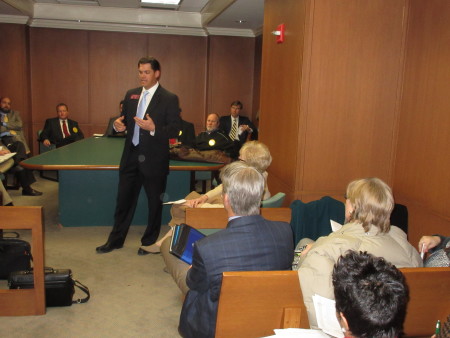State Rep. Geoff Duncan represents a wealthy suburban area north of Atlanta.
That makes the Cumming Republican, at first glance, an unlikely person to sponsor a proposal to help struggling rural hospitals in Georgia.
House Bill 919, as proposed by Duncan, is unusual. It would allow individuals and corporations to get a state tax credit for donating money to rural health care organizations.
Duncan met with rural hospital officials at the state Capitol on Thursday to explain his legislation.
A total of $250 million in state tax credits per year would be available, if the bill is ultimately approved.
“Why $250 million?’’ he said. “Because the problem is big. . . . This is a big ask.”

“No doubt rural health care is one of the biggest issues in the state,’’ he said.
Four rural hospitals have closed in Georgia since the beginning of 2013. A fifth, Hutcheson Medical Center in Fort Oglethorpe, briefly closed in December before reopening in a downsized format.
Many others are struggling financially. Rural hospitals face some daunting challenges, including many patients who are likely to be unemployed, insufficiently insured or not insured at all.
Meanwhile, the government programs Medicare and Medicaid, which cover many rural patients, have tightened reimbursements to hospitals. And in states that have not expanded Medicaid, such as Georgia, hospitals continue to have a heavy burden of patients who can’t pay their bills. (Expansion extends Medicaid coverage to more people, allowing more reimbursement for their health providers.)
Duncan’s contribution idea has been “extremely well received,’’ said Jimmy Lewis, CEO of HomeTown Health, an organization of rural hospitals in the state.
“It is certainly a novel approach,’’ said Lewis, who added that he did not know of such a contribution program in another state. Duncan “is thinking outside the box to help rural hospitals and rural health care.”
Under the bill, the organization receiving the donation must be in a rural county and receive at least 25 percent of its net patient revenue from treating indigent patients.

The contributing individual would get a tax credit of 90 percent of the actual amount donated or $2,500 per tax year, whichever is less; or in the case of a married couple filing a joint return, 90 percent of the amount contributed or $5,000 per tax year, whichever is less.
A corporation or other entity would be allowed a tax credit in an amount not to exceed 90 percent of the actual amount expended, or 75 percent of the corporation’s income tax liability, whichever is less.
The contributor can designate the specific organization.
Duncan likened the rural health proposal to the Georgia Student Scholarship Organization, which accepts and manages tax-credit donations funding scholarships for children attending private schools in the state.
Duncan, asked by GHN why he sponsored a bill to help organizations in rural areas, said his church was an influence, and that the measure of a person’s wealth is in their philanthropy.
“It’s not how much you have, but how much you give,’’ he said.

